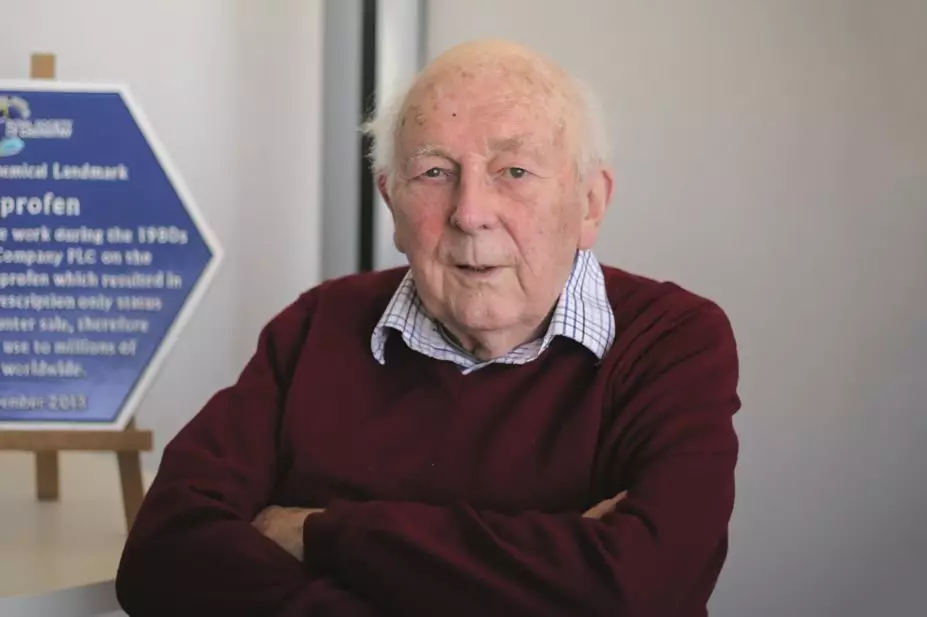
Walgreens Boots Alliance
In 2015, Boots UK sold an average of one pack of ibuprofen every 2.92 seconds and, across all UK retailers, the sales figures for the medicine reached over £150m. Despite this, however, Stewart Adams, the pharmacist who led the team that discovered one of the world’s most popular painkillers, says the achievement has had no effect on his lifestyle whatsoever. “People assume that I must be a very rich man because of the success of ibuprofen but I can assure you that neither John [Nicholson, Adams’ scientific partner] nor I received any financial reward for the success that we did have,” says Adams, now 92 years of age, who worked for Boots for 54 years.
It took 16 years of tireless research before Adams finally made his breakthrough discovery. But it began not with a quest to find a general painkiller, but to produce a new drug for rheumatoid arthritis.
Road to discovery
“It started in 1953. In those days there were only two drugs on the market that had an effect on the pain of inflammation — a corticosteroid drug and aspirin in high doses,” Adams reflects, “I felt that the steroid was not suitable for long-term use and [taking] high doses of aspirin — 12, 15, 18 tablets a day — was always going to be unacceptable to many patients.”
At the time there was little literature about aspirin, a discovery which came as a huge surprise to Adams. “Aspirin was actually introduced into clinical medicine as an antipyretic, round about 1900,” he says. “Between then and the late 1950s nobody had looked at aspirin analogues for their anti-inflammatory activity.”
So, with the help of chemist John Nicholson, Adams set to work to do just that. “We started off looking for the activity of aspirin analogues and John made a few but we never found anything that was better than aspirin. That was our first major disappointment because I felt that there was a good chance that we’d find something better.”
The pair continued to test the potency of hundreds of other compounds, with some going to clinical trial and one even making it to market but, again and again, they came up against inactive compounds or unacceptable side effects.
“I did get depressed on more than one occasion,” Adams recalls, “But I felt that, once we started to get the active compounds, there was something that would come out of it.”
He was right. “We did a bit more thinking, John produced a few more different compounds and we finished up with a group of compounds called the propionics, which are now well known in the anti-rheumatic area. But we had the advantage of the first one, which was ibuprofen,” he explains.
“It wasn’t the most active of the compounds that we found but, on the basis of the work that we’d done, we thought it was likely to be the best tolerated and that was one of the important points we were looking for. It went to clinical trial. It was active and well tolerated and went on to a lot more trials. Then, in 1969, 16 years after I started, it was approved by the health authorities in the UK as a drug for the treatment of the rheumatic diseases.” They had found a new non-steroidal anti-inflammatory drug (NSAID).
During these years Adams was so committed to his cause that he often tested compounds on himself. “I was the first to take the single dose [of ibuprofen] and later on I took a few doses,” he recalls. “I always felt that if you were going to ask volunteers to take a drug and later patients, you ought to be prepared to take it yourself. In the case of ibuprofen it caused a slight burning in the back of the throat so the tablets were sugar coated.”
Adams describes ibuprofen as a “slow starter” once it was on the market. The pair again experienced disappointment because the dose they had chosen was probably too low for patients to reap the optimal effects. However, as doctors started to use higher doses and saw positive results, ibuprofen sales suddenly took off and the drug became one of the best-selling anti-rheumatics in the UK.
But it did not stop there. “We knew from our experimental studies that ibuprofen was an analgesic and also an antipyretic so, throughout the 1970s, we looked into a whole range of painful conditions — headache, toothache, dysmenorrhea, that sort of pain,” he explains.
“After five years of discussions with the UK health authorities, in 1983, ibuprofen was approved as an over-the-counter (OTC) product — one of the first in the UK to move over from being a prescription product to an OTC, non-prescription and, at that stage, pharmacy-only product. We never looked back.”
Falling for pharmacy
Despite always having a keen interest in science, Adams says he fell into pharmacy “purely by chance” after his aunt, a Justice of the Peace in Daventry, Northamptonshire, started a conversation with the uncle of a senior executive in The Boots Company. After a successful interview, Adams joined Boots in 1939 on a three-year apprenticeship in March, Cambridgeshire. He remained loyal to the company from then until his retirement in 1993, even working Sundays during university in the Boots day and night shop.
“In those days you had to have a registered apprenticeship before you could go on to get a pharmacy qualification,” explains Adams, who, in 1942, went on to do a bachelor of pharmacy (BPharm) degree at University College, Nottingham. “I hoped it would open up more possibilities which it did, of course,” he quips. As a pharmacy student, Adams was exempt from the Second World War and was awarded his degree in 1945.
Adams says that he “made a great mistake” by leaving school at 16, but he did not let it hold him back. Funded half by a Pharmaceutical Society research scholarship and the rest by Boots, he went on to complete a PhD in pharmacology at Leeds University. Adams says he is “indebted” to the Pharmaceutical Society for enabling him to continue his studies.
On completion of his PhD, Adams returned to Boots in 1952. “When I’d just finished my degree I was thinking of going into the Navy, but at that time I was offered a job at Boots in the penicillin department and that seemed to be exciting.” However, he remembers the job, which was at the main Boots site in Nottingham, as being disappointingly unchallenging and so he was moved to the research department where he began his quest for a drug to treat rheumatoid arthritis.
From humble beginnings
During the war, Boots had been forced to move its research facilities out of central Nottingham as the research department had been partially destroyed by bomb attacks. “For the first six years of the project we were in the front room of a Victorian house, not the best of circumstances by any means, but that time was undoubtedly the most important six years of the project. We really did get it off the ground there,” remembers Adams.
In these years Adams says he was fortunate enough to have the opportunity and freedom to take his work in the direction he wanted, “and, might I add, I took it as well and sometimes overstepped the mark I think!” he jokes. “I didn’t have a lot of interference, it was nice to be able to have a degree of autonomy.”
When asked what his main challenges were during his career, Adams remembers back to these early days: “My biggest challenge was having a sort of blank piece of paper in front of me and looking for a new drug for the treatment of rheumatoid arthritis when no one knew what caused it.”
Adams officially retired from the research department at Boots, where he was head of pharmaceutical sciences, in 1983. However, this was also the year that ibuprofen became an OTC drug, so he was asked if he would stay on as a consultant for both the OTC and prescription products. “So I worked full time for a year or two and then part time for the next ten years,” he explains.
The impact of ibuprofen
Looking back on his immense contribution to healthcare and pharmacy in particular, Adams says he is pleased that hundreds of millions of people worldwide are now benefiting from the drug he discovered. However, in terms of his personal benefits, he says that the discovery enabled him to travel the world. “I managed to travel to different countries where, at that stage, other people were unable to travel. I went to Syria, I talked in Damascus and Aleppo, I went to Moscow during the Cold War and China when everybody was cycling about the roads on bikes. I think I did every country in Europe apart from Bulgaria. It opened up lots of doors to me.”
Adams has been honoured for his research, with an honorary doctorate of science from the University of Nottingham, and two blue plaques from the Royal Society of Chemistry. In 1987, Adams was appointed OBE for his work in developing ibuprofen. In 2013, Adams was made an Honorary Freeman of Nottingham, the highest honour a council can bestow. Jesse Boot, who established The Boots Company, received the same honour in 1920.

